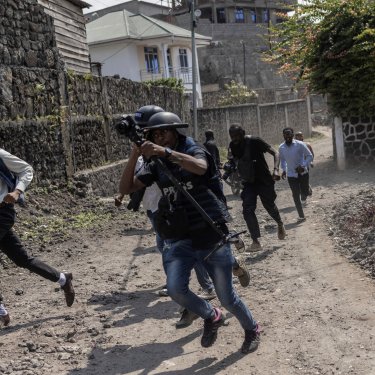Displaced reporters censored again in areas held by M23 rebels in eastern DRC

M23 rebels in the eastern Democratic Republic of Congo’s Nord-Kivu province have ordered radio stations in the areas they control to stop broadcasting a popular programme for two months pending further evaluation. This arbitrary censorship is a grave violation of journalistic pluralism just six months before the DRC’s next presidential election, says Reporters Without Borders (RSF).
Mise à jour du 10/08/23 : Des miliciens du M23 ont convoqué en ligne ce jeudi 10 août des responsables de médias de la zone du Nord Kivu. Au cours de cette réunion, ils ont autorisé les journalistes à reprendre la production de l'émission "Sauti Ya Wahami" ("La voix des déplacés"), suspendue arbitrairement depuis le 14 juillet.
This is the second time in five months that M23 has banned “Sauti Ya Wahami” (The Voice of the Displaced), a Swahili-language programme produced by journalists in Goma, the provincial capital, which is outside the rebel-controlled areas. The latest ban was issued by the head of the M23 communication and media department on 14 July in the form of a WhatsApp to all radio station directors in the areas it controls.
Created in November 2022 to give a voice to the victims of the war between M23 and the DRC government’s armed forces (the FARDC), “Sauti Ya Wahami” is produced and hosted by around 50 journalists, most of them internally displaced persons who have moved to Goma from rebel-held parts of the province, especially in Masisi Territory and Rutshuru Territory.
Journalists with partner radio stations in the occupied areas have been cooperating with the displaced journalists in Goma, gathering information for them and even sending reports that are edited by the Goma-based journalists. M23 issued its ban several weeks after this cooperation began.
The ban on broadcasting this popular radio programme is a grave attack on journalistic pluralism. The unacceptable pressure to which media outlets continue to be subjected by the M23 rebels in this region encourages self-censorship and affects the quality of the news they provide. As the DRC enters an important election period, journalists must be able to practice their profession without fear of reprisals.
Radio stations that broadcast “Sauti Ya Wahami” or help to produce it have on several occasions received visits from M23 rebels, who have threatened and intimidated their staff. The M23 summoned radio station directors in February and ordered them to stop broadcasting the programme on the grounds that it “incites hatred.” Fearing reprisals, the radio stations complied.
Many radio stations gradually resumed broadcasting the programme from April onwards. But the directors of these radio stations finally received this message from M23: “You are invited to the meeting on 10 August to evaluate this programme (...) In the meantime the programme continues to be suspended. You are reminded that Top Congo also continues to be suspended. The evaluation is only for the programme ‘Sauti Ya Wahami.’”
Top Congo FM, which broadcasts from the DRC’s capital, Kinshasa, is one of the region’s most popular stations. Radio stations in M23-held areas have been forbidden to retransmit its programmes or cooperate with its producers since February.
Ever since fighting between M23 and the FARDC resumed in 2021, the media in Nord-Kivu have been constantly harassed by both sides. On the one hand, M23 threatens them and orders them to stop broadcasting certain news programmes. On the other, they feel abandoned by the government, which threatens journalists with reprisals if they yield to M23’s threats.
